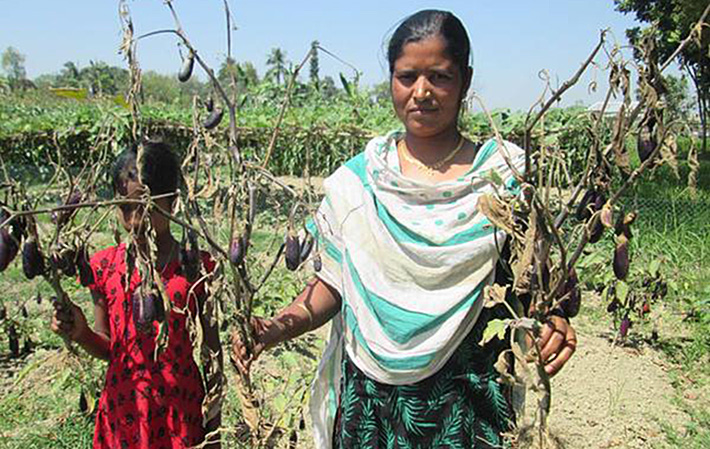
GM plants either died out prematurely or fruited insignificantly compared to the locally available varieties
The Bangladesh Agricultural Research Institute (BARI), which is distributing Bt brinjal saplings, must cease this cruel experiment at the expense of Bangladeshi farmers. The chief promoter of the failed GM Bt brinjal, BARI director general Rafiqul Islam Mondol, should resign.
Bt brinjal was found to be toxic in Mahyco’s (subsidiary of Monsanto) own tests.
—
Bt brinjal turns out to be ‘upset case’ for farmers
New Age (Bangladesh), March 21, 2015
http://newagebd.net/105070/bt-brinjal-turns-out-to-be-upset-case-for-farmers/#sthash.CmJMx3w3.krtNeqob.dpbs
The cultivation of genetically engineered Bt Brinjal in the country’s several districts has cost the farmers their fortunes again this year as the plants have either died out prematurely or fruited very insignificantly compared to the locally available varieties, reports United News of Bangladesh.
Spot visits to 12 Bt Brinjal fields in Manikganj, Narsingdi and Comilla over the last one month hardly found any living or properly fruiting plant on those fields.
BARI Bt Brinjal 2 (Bt-Nayantara) and BARI Bt Brinjal 3 (Bt-Kajla) were cultivated by four farmers at Pouli village in Manikganj Sadar under the supervision of Bangladesh Agricultural Research Institute (BARI). The fields belonging to Afzal Hossain and Md Mannaf have turned out to be an ultimate upset as each of the two fields appears half-barren as one looks at.
‘We’ve removed most of the plants after those had died about 15 days ago. The officers (BARI officials) told us to do so to prevent the spread of the disease. Despite that the rest of the plants are dying out in numbers every day,’ Mannaf’s wife Lovely Begum said.
Although only a few of the Bt Brinjal plants have died so far in two other fields cultivated by Boltu Miah and Abul Hossain, who are brothers, of the same village, the fruiting of the plants is nowhere near the satisfactory level, said Lal Chand, father of the two brothers.
The two Bt Brinjal varieties were also cultivated by three farmers at Dhanua village in Shibpur upazila of Narsingdi. All of them ended up miserably.
Md Abul Hayat, who is respected as a successful farmer in the locality, said, ‘Most of the saplings (of Bt Brinjal) have died. The plants are prone to diseases. The officials said it’s due to bacterial attack and prompted by irrigation and soil-type.’
‘If irrigation and soil-type had been a problem, why the local brinjal plants on my other field had not been affected?’ he questioned pointing to a brinjal field beside his Bt Brinjal one.
‘One can’t believe that just one month ago, the plants on my field (Bt Brinjal) were most good looking ones among all the brinjal fields in Shibpur. They (officials) came to my field and took photos and videos of the plants at that time,’ Hayat noted.
The sight of the Bt Brinjal field of Md Alamgir of neighbouring Baghab village in the upazila was more pathetic. ‘Many of the saplings had died at an earlier stage… one month into the planting. The officials replaced the dead plants with fresh ones but those have died too,’ he said.
Harun Mirza, Dilip Kumar Das and Mohammad Ali of Burichong upazila in Comilla planted BARI Bt Brinjal 1 (Bt-Uttara) and BARI Bt Brinjal 4 (Bt-ISD 006) on about 18-20 decimal plots. All the three claimed that around 150-200 of the 500-700 saplings that were provided to them died earlier within one month’s of the planting.
The fresh plants that replaced the dead plants also could not survive, while the most of the rest are also dying out, they added.
Mohammad Ali of Nimsar village in the upazila also showed several plants of BARI Bt Brinjal 4 variety that were affected by Brinjal Fruit and Shoot Borer (BFSB) insects. ‘We were told that these brinjal varieties are resistant to Phol of Doga Chidrokari Poka (BFSB), but the plants on my field have come under its attack,’ he said while showing an affected plant.
Meanwhile, farmers in Sherpur, Mymensingh, Rangpur, Dinajpur, Rajshahi, Pabna, Jessore, Gazipur and Tangail districts shared similar experiences with this UNB correspondent when they were contacted over phone.
At least 25-150 of the Bt Brinjal plants died on each of the Bt Brinjal fields in these districts. The dead plants also include some of BARI Bt Brinjal 5 variety that was cultivated in Dinajpur.
Md Haminur Rahman and Md Mobarak Hossain of Sherpur Sadar upazila said they have harvested 8-10 maunds of Bt Brinjal three months since the planting. It is less than half the amount that could by this timeframe be harvested from a local brinjal field of the same size, they noted.
Ramzan Ali of Jhikargachha upazila in Jessore said most of the Bt Brinjal plants in his field had died.
Asked about the dying of Bt Brinjal plants in the districts mentioned above, BARI director general Rafiqul Islam Mondol said, ‘We didn’t claim that the Bt Brinjal plants will not be affected by diseases. Our claim was that Bt Brinjal is resistant to BFSB.’
Asked about the BFSB infestation in at least one Bt Brinjal field in Comilla, he said, ‘I don’t have any such information. One or two non-Bt plants can be mistakenly grouped with the Bt plants in that field.’